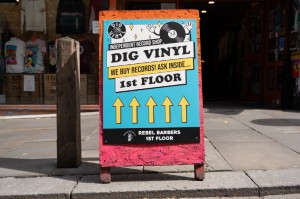“Is ambient the soundtrack to our emotional and mental fatigue?” – Alien Sound Symposium

This weekend Tate Liverpool plays host to Alien Sound, a symposium exploring ambient noise and music. We spoke to organiser Jon Davies about something we might typically associate with relaxation, its development, and “the limits of the human”…
The Double Negative: For the uninitiated, what is ambient?
Ambient is the background, or a particular atmosphere which is generally conceived as congruent to its environment. So, with music it’s about creating such an atmosphere, usually soothing or drifting, emphasising texture over more concrete musical qualities. There’s a sense of stillness, more often than not, and you would usually have people like Brian Eno, John Hassell, even Aphex Twin populate the genre. I guess it follows from the “furniture music” of French composer Erik Satie and is adjacent to New Age and Meditation music, however to me the latter has a specific quality that is different to ambient.
How is it changing? What is ‘disturbing ambience’ and when did it come about?
Ambient music, to me, displays a sense of neutrality, calming and a resonating texture to the world around it. Incidentally, this posits a rather universal objectivity to the world as we sense it, or at least maps the world of sound from a particular perspective. Disturbing the ambient can happen in different ways, from quietly inviting incongruent textures, noises and sound sources into the sonic spectrum, or by contextualising the ambient differently, from exposing its occidental (western) perspectives, to understanding why ambient music is popular aesthetically and as a ubiquitous audio.
Can you tell us a little about how it has been used in the commercial world, and to what end?
Ambient music has always had a relationship with the commercial world, from soothing the shopping centre to creating fantasies of exotic lands. In the 21st Century ambient is turning towards private and virtual spaces thanks to streaming platforms such as Spotify. Writers such as Liz Pelly and Paul Rekret (who is part of the symposium) have recently been writing on streaming music, labour and the music market, not only how Spotify is changing our listening habits towards passivity, but also how it is coercing music into homogenous moods rather than specific communities and genres, as well as feeding on the precarious lives of listeners.
Does ambient, then, need to be recuperated, or reclaimed, to some extent?
It doesn’t have to be, in many ways I’d rather it withered away as a genre! But in the face of ambient emerging as ever more popular, I think it’s time to ask questions about ambient’s relationship with our daily lives. What is ambient for, what’s the role of non-ambient music in our times, is it the soundtrack to our emotional and mental fatigue? I’m particularly interested in artists who use the term ambient to subvert its claims of consonance, from Chino Amobi’s Airport Music For Black Folk holding up a mirror to the white privilege of artists imagining neutrality into a space, to music which uses ambient textures to haunt rather than soothe (such as Felicia Atkinson, Indignant Senility).
Do technological developments affect the way we create and interact with music and sound art?
Absolutely, extending from Pelly’s work on critiquing Spotify, we can also look at the ways in which ambient tends to ‘preserve’ found sounds of far-away spaces, much like bringing a souvenir back from your travels. Also, the emergence of ASMR composition, which has begun populating YouTube and creating more accessible ambient therapy.
What form will the symposium take, and who is speaking?
The symposium will mostly consist of talks, plus three performances from House of Rosen, Annalaura Alifuoco and Silvia Battista, and Steve Davismoon. We’ve attempted to focus on the social and political implications of ambient, including how we can conceive of a black ambient (Dhanveer Singh Brar) and how ambient is deployed to speculate on the effect of the womb (Marie Thompson).
Tell us a little about the playlist you’ve made for us.
The playlist is a mix of artists reimagining the notion of ambience through opening the field of experience and foregrounding the unconscious thought, as well as a few choice picks from ‘chill’, ‘study’ and ‘sleep’ picks online.
Mike Pinnington
Alien Sound: Ambient Music and the Limits of the Human, Saturday, from 10.30am, Tate Liverpool – £5/£3





